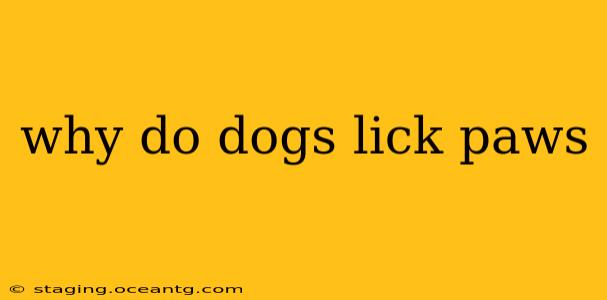Dogs licking their paws is a common behavior, but the reasons behind it can range from harmless habits to indicators of underlying health issues. Understanding why your dog engages in this behavior is crucial for ensuring their well-being. This comprehensive guide explores the various reasons behind excessive paw licking and helps you determine when to seek veterinary attention.
Is Paw Licking Normal?
Occasional paw licking is perfectly normal. Dogs might lick their paws to clean them after a walk, remove irritants like dirt or debris, or simply because it feels good. However, excessive paw licking—that is, frequent, intense licking that leaves the paws red, raw, or inflamed—is cause for concern.
Common Reasons for Excessive Paw Licking
Several factors can contribute to excessive paw licking in dogs. Let's delve into the most common ones:
1. Allergies (Environmental and Food)
Environmental allergies: Pollen, dust mites, mold, and other allergens can irritate a dog's paws, leading to intense licking. The paws are particularly vulnerable because they're constantly in contact with the ground.
Food allergies: Certain food ingredients can trigger allergic reactions, manifesting as itchy paws and excessive licking. Common culprits include beef, dairy, chicken, and wheat.
2. Skin Infections and Parasites
Bacterial, fungal, or yeast infections can cause intense itching and inflammation in the paws, leading to compulsive licking. Parasites like fleas, ticks, and mites can also irritate the skin and trigger this behavior.
3. Injuries and Irritation
Cuts, scrapes, burns, or foreign objects embedded in the paws can cause pain and discomfort, prompting your dog to lick the area excessively. This is a natural response to soothe the injury.
4. Dry Skin
Just like humans, dogs can suffer from dry skin, especially during colder months or in dry climates. Dry, cracked paws can be itchy and uncomfortable, leading to increased licking.
5. Anxiety and Stress
Licking can be a self-soothing behavior for anxious or stressed dogs. If your dog is experiencing anxiety, they might lick their paws excessively as a way to cope.
6. Underlying Medical Conditions
In some cases, excessive paw licking can be a symptom of underlying medical conditions like autoimmune diseases, hormonal imbalances, or even certain types of cancer.
When to See a Veterinarian
If your dog's paw licking is excessive, persistent, or accompanied by other symptoms like redness, swelling, hair loss, limping, or changes in behavior, it's crucial to consult a veterinarian. Early diagnosis and treatment can prevent complications and ensure your dog's comfort.
How Can I Help My Dog Stop Licking Their Paws?
Depending on the underlying cause, there are several ways to address excessive paw licking:
- Identify and eliminate allergens: This might involve changing your dog's diet, using hypoallergenic cleaning products, or avoiding certain outdoor environments.
- Treat skin infections and parasites: Your veterinarian can prescribe appropriate medications to address infections and parasites.
- Keep paws clean and moisturized: Regular paw cleaning and the application of paw balm can help prevent dryness and irritation.
- Manage anxiety and stress: Provide your dog with a safe and comfortable environment, engage in calming activities, and consider seeking professional help if needed.
- Consider Elizabethan collars (E-collars): These collars can prevent your dog from licking their paws, allowing the skin to heal.
Why Does My Dog Lick Their Paws After a Walk?
This is often due to irritants picked up during their walk, such as burrs, thorns, pollen, salt, or chemicals. Thorough cleaning of the paws after each walk is essential.
Why is My Dog Licking Their Paws Until They're Raw?
This indicates a serious underlying issue, likely a skin condition, allergy, or injury. Immediate veterinary attention is required to diagnose and treat the problem.
Can Human Lotion Help My Dog's Dry Paws?
No. Human lotions often contain ingredients that are toxic to dogs. Use only pet-specific paw balms or lotions recommended by your veterinarian.
By carefully observing your dog and understanding the potential causes of excessive paw licking, you can take appropriate steps to address the issue and ensure their well-being. Remember, when in doubt, consult your veterinarian for expert advice.
